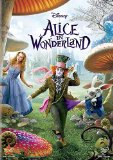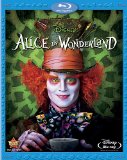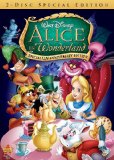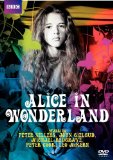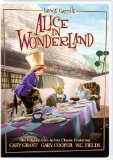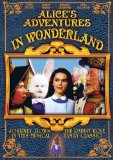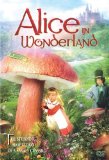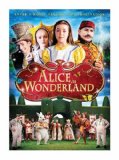| music/arts/books |
alivingdog.com |
 |
 |
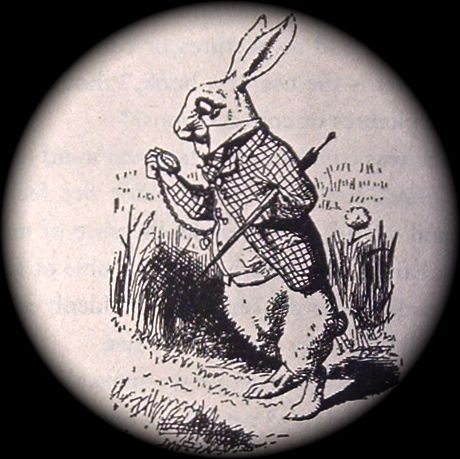 |
| Scott Sentinella
Considers Various Video
Versions of Lewis Carroll's Timeless Tale |
|
Wonderland
Revisited
Wonderland
has been conquered by the Red Queen (Helena Bonham Carter), who has an
enlarged head, a towering henchman (Crispin Glover) and a fondness for
beheadings. The Red Queen's sister, the White Queen (Anne Hathaway), is
the rightful ruler of Wonderland, and an ancient scroll proclaims that
Alice is the Chosen One who must slay the fearsome Jabberwocky
(Christopher Lee's voice), so the White Queen can regain her power.
Events climax in a battle of the computer-generated armies, a familiar
sight to anyone who's seen The
Golden Compass or Prince
Caspian.Burton's Alice plays more like a combination of The Lion, the Witch and the Wardrobe and The Wizard of Oz than Carroll's tale of madness underground. But, in Burton's opinion (noted in interviews for the film), other Alice movies followed the book, which meant no likable characters, no plot, and no reason for audiences to care. This worked on the page, but on the screen, it left many thinking "what was all that about?" |
The Animated Alice..............................................
|
Burton's
take on Carroll's characters is still rather dark. A monster gets its
eye plucked out, another is beheaded (and its blood drank), and Alice
swims through a moat full of severed heads. These sequences tend to
push the film's "PG" rating to its limit. Still, for those around nine
and up, there is much to enjoy here, at least on the level of eye
candy. Virtually everything in Wonderland is computer-generated,
including several of the characters, and it's an unsettling combination
of live-action and digital animation.
Wasikowska
is interestingly sober, Bonham Carter is amusing, and Hathaway floats
like a Disney princess. However, Depp (who doesn't appear until 30
minutes in) is basically imitating himself: he's a little silly, a
little goofy, and not as much fun as Jack Sparrow. But if you always
hated "Alice" because it has no plot, this may be the version for you.
Burton's film is a Disney makes an interesting contrast to the 1951 Disney animated version, a flop in its time. The '51 film is a semi-faithful adaptation of the book, with a then-famous voice cast, and it's probably the most frenetic animated feature produced by Walt Disney himself. The animation is brilliant, but the storytelling incredibly uneven, with the Mad Tea Party being the highlight. The DVD features many extras. |
|
|
Alice through
the Ages
Disney's
Alice films are
certainly the best known, but there are others. The
1933 rendering is a fascinating mess, with a huge cast (Gary Cooper,
Cary Grant, W.C. Fields, etc.) wearing grotesque masks instead of
makeup. The effect is rather creepy, and the primitive special effects
only add to the unnerving tone.
The intriguing 1966 BBC production, directed by Jonathan Miller, is the
most adult, with no animal costumes, no special effects, a sitar-heavy
score written by Ravi Shankar and most of the dialogue taken straight
from the book. The all-star cast, including Peter Sellers, John Gielgud
and Malcolm Muggeridge, plays the material
very dry; the effect is more of an attack on Victorian England than a
kid's movie, and children should probably avoid it. (The DVD features a
docudrama about how Carroll wrote the book; this featurette, at 70
minutes, is almost as long as Miller's entire film.)
|
|
|
Sellers pops up again
in the 1972 version, which, like the '33 and '51 productions, was a
financial flop. It's not bad, with lush cinematography, a dreamy score
and a starry cast (Dudley Moore, Michael Crawford, Ralph Richardson,
etc.) cavorting on lavish sets. The main problem here is that the 1972
film is already in the public domain, which means that any DVD editions
that you may find are likely to be in very poor shape. This picture is certainly better than the appalling 1985 Irwin Allen miniseries of Alice, with another glittering cast (Ringo Starr, Anthony Newley, Carol Channing, etc.) failing to capture the story's unique tone. Like Burton's film, the 1985 version wants to be The Wizard of Oz. |
|
|
Alice on the
Small Screen
In
1999, the novel was again adapted for television, with another stellar
cast (Miranda Richardson, Ben Kingsley, Gene Wilder, etc.) floundering
amidst another lavish production, and a way-too-long running time of
134 minutes. The high point of the movie is again the tea party, with
Martin Short as the greatest Mad Hatter ever committed to live-action
film.These
productions are all intriguing but unsatisfying attempts to wrestle
with Carroll's truly great book. The films are visually compelling, if
nothing else, and, for some, that may be enough. True Alice fans
might find the animated version to still be the best one, but if you've
never read the novel, Tim Burton's plot-driven adaptation may be the
most satisfying. Perhaps that accounts for its (as of 2010)
jaw-dropping one billion
dollars in worldwide box office.
|
|
| Also by Scott Sentinella: Roald Dahl on Film |
|
Scott Sentinella has
been published in Cashiers du
Cinemart, Animato!, Videomania, The Gardena Valley News, and the Carson (CA) News. He has devoted
more of his time to books and pop culture than he would care to admit.
|
| dvds |
doghouse |
